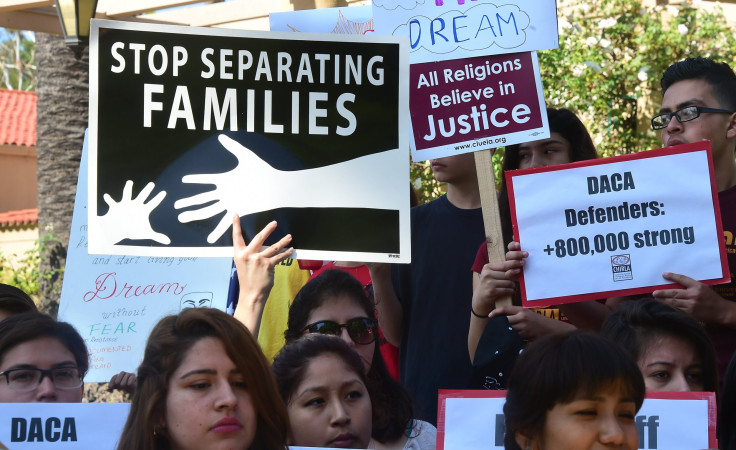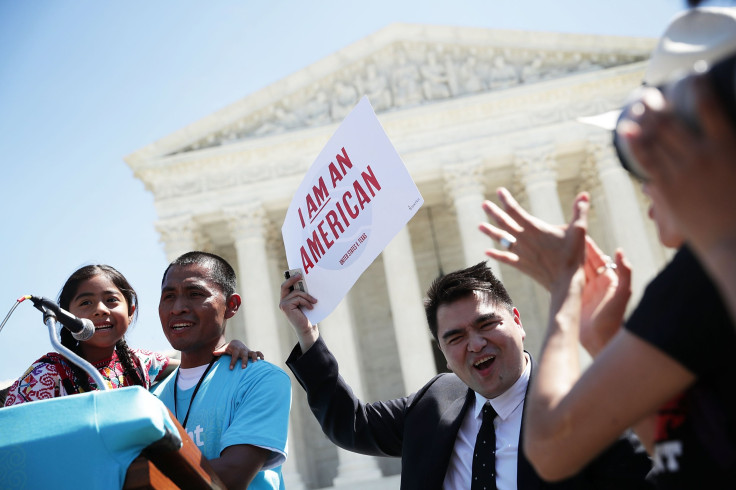DACA Recipient Dies Helping Harvey Victims As Trump Moves To End Program

Less than 48 hours before President Donald Trump announced that he will soon be terminating the Deferred Action for Childhood Arrivals (DACA) program on Sunday, the body of a former DACA recipient, who volunteered in helping out Hurricane Harvey victims, washed ashore Cypress Creek in Spring, Texas.
Alonso Guillen, a 31-year-old disc jockey, who was born in Piedras Negras, Mexico, moved to the United States, under the shelter of DACA. He has been living in Lufkin, Texas, ever since he was a teenager.
As soon as Harvey made landfall, Alonso borrowed a towboat along with some friends and headed to Southern Texas to try and aid people who were trapped due to the natural disaster, Houston Chronicle reported. They were on their way to an apartment complex near the Interstate 45 and Beltway 8 when the hurricane struck the bridge over the creek and capsized Wednesday. Search crews went looking for Alonso after he went missing. His body was discovered on Friday 1 p.m. local time (2 p.m. EDT).
His father, Jesus Guillen, now a permanent resident of the U.S., had asked Alonso not to risk his life, assisting in the storm-stricken areas of Texas, but the latter insisted on helping out those in need. "Thank you, God, for the time I had with him," Jesus prayed, as the authorities pulled his son’s body out of the water.

Alonso’s mother, Rita Ruiz de Guillen, 62, who has applied for a legal status is still awaiting entry into the U.S. After learning of her son’s death, Rita requested the Customs and Border Protection (CBP) officials to grant her a humanitarian visa so that she could come to Houston, Texas, and bury her son, but in vain.
"I've lost a great son, you have no idea," she said. "I'm asking God to give me strength." She also added: "When we are with God, there are no borders. Man made borders on this earth."
DACA was launched by former President Barack Obama in 2012, as a way to grant immigrant children temporary protection from deportation, if they have brought illegally to the U.S. at a very young age. Even though Trump had vowed to shut down DACA as soon as he became the president, branding it unconstitutional, he had deferred his decision on doing so over the months, after taking office.
"We are going to deal with DACA with heart," Trump said at a February news conference, Business Insider reported. "To me, it's one of the most difficult subjects I have because you have these incredible kids - in many cases, not in all cases. But you have some absolutely incredible kids - I would say mostly - they were brought here in such a way. It's a very, very tough subject."
Nevertheless, after deliberating over the fate of the “Dreamers” program with both the Department of Justice and Department of Homeland Security, the president decided to scrap it with a six-month delay.
Many Democrats including former Secretary of State Hillary Clinton and Vermont Gov. Bernie Sanders have condemned Trump’s decision for shredding DACA.
No time to waste - we've got to fight with everything we've got to #DefendDACA. Thanks, @jorgeramosnews, for sharing these powerful stories. https://t.co/rNtZZ4ONBy
— Hillary Clinton (@HillaryClinton) September 4, 2017
If Trump decides to end DACA, it will be one of the ugliest and cruelest decisions ever made by a president in our modern history. https://t.co/EXfRAy5azO
— Bernie Sanders (@SenSanders) September 4, 2017
How is deciding to end #DACA & disrupt hundreds of thousands of #DREAMers' lives in line with the spirit of today's National Day of Prayer?
— Chelsea Clinton (@ChelseaClinton) September 4, 2017
Dreamers came to US as kids. Had no say. Trusted gov enough to come fwd & sign up for DACA. Trump now has list of who registered. Betrayal.
— Ben Wikler (@benwikler) September 4, 2017
At the same time, many Republicans stood up in support of ending the program
#DACA is unconstitutional. American citizens should be 1st
— Pastor Mark Burns (@pastormarkburns) September 4, 2017
#MakeAmericaGreatAgain 🇺🇸 👍🏽 https://t.co/O8tNrCsX8m
— Katrina Pierson (@KatrinaPierson) September 4, 2017
Ending DACA now gives chance 2 restore Rule of Law. Delaying so R Leadership can push Amnesty is Republican suicide. https://t.co/iYOLxFWp7V
— Steve King (@SteveKingIA) September 4, 2017
According to Linna Martén, a postdoctoral scholar at the Stanford Immigration Policy Lab, there has always been lack of evidence to support the advantages or disadvantages of the DACA program, which might have made Trump’s decision on the issue not so difficult. “DACA is the largest immigration reform in the US since the mid-1980s, but so far there have been almost no credible studies of how it has affected unauthorized immigrants and their families. Hence, policymakers have lacked concrete evidence to make informed decisions about the future of DACA,” she said, Phys reported.
© Copyright IBTimes 2025. All rights reserved.






















